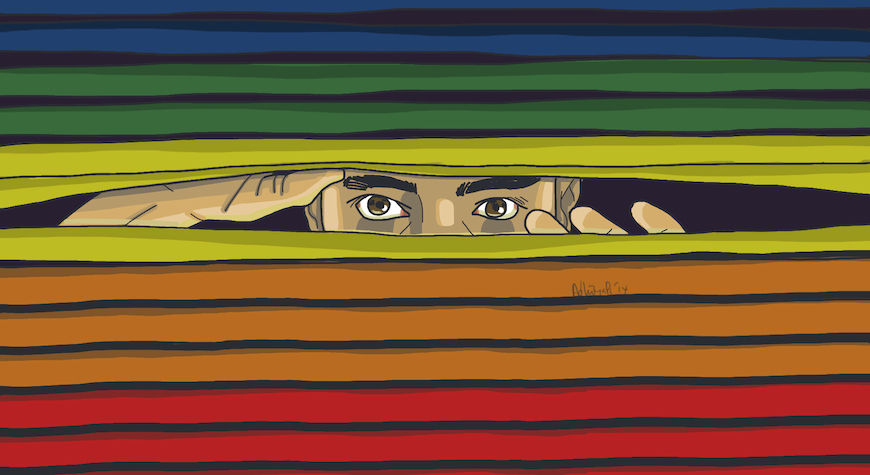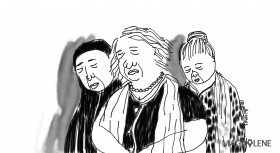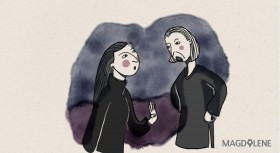Ando (a pseudonym) was sitting in the corner of the café while his cup of coffee was left untouched on his table. He had been waiting for me for the last half hour. After apologizing, I shook his hand and formally introduced my name. I knew him two days before from Twitter, when he sent a message asking to meet to share his stories.
He told me that discovering his sexuality had been a big journey but wasn’t a problem for him. Since his last year in university, he has fully acknowledged his sexual interest in men. But when we met, I was still the fourth person to know his sexuality.
“The problem is gays always spill the beans,” he said.
For him the issue of personal safety. Ando shared his feeling of being tired of loneliness. He feels alone lacking the support of those who know him as he is.
His first come-out moment was when he revealed his sexuality to his best friend, a straight cis-male. His friend’s response wasn’t bad, and nothing changed about their friendship after the revelation. Still, the straight friend couldn’t understand Ando, presuming that he could “get back to normal” and that “this might be just a phase”. Ando decided to never to talk about his struggle on his sexuality anymore to this friend.
Interestingly, his circle friends include a few gay friends, but Ando complained of their chattiness and their tendency to talk about other gay men.
“You know that gossip is a part of the gay culture, right? When we’re hanging out, they always talk about other gay people. If I let them know that I’m gay, it’s the same as letting all gays in the city know about me.”
When he messaged me on Twitter, he said that he desperately needed a support system, especially regarding his sexuality. He didn’t mean to lock himself in the closet, but the only gay peer group that surrounds him doesn’t seem very convincing for his coming out plan.
Gay, Groups and Gossip
Finding a circle that supports you for who you are is an important need for any member of the minority groups. For gay people, whether young or those facing a quarter life crisis, the self-acceptance issue can lead to mental problems. Having acknowledged and accepted that they are different, they still need a support system to keep them from feeling lonely. But the limited amount of time spent among people who are like them often limit the topics of the conversations, and topping the list is the updates on the gays in town.
This makes it hard for discreet people, who prefer to keep their identity a secret except to a select group of people, to find a supportive circle of friends. They end up taking their secrets with them to Twitter through altered accounts or to Grindr with obscured photo profiles.
Being outed and becoming the topic of gossips aren’t the only things that happened when you opened up about your sexuality. Being socially condemned, facing discrimination at work, and being criminalized are some of the threats faced by the LGBT community general. The organization Arus Pelangi in 2013 reported that 89.3 percent of LGBTIQ in Indonesia have experienced violence.
What Twitter alter accounts give to closeted gay people looking for social interaction with other gay online, community-based organizations provide that safe space offline.
Last year, I found out about a regionwide WhatsApp group for gay community. The group, which is aimed for young people, is also linked to a local NGO that focuses on HIV prevention. One of the administrators explained to me that the community also networked with other similar groups.
We went to an event that celebrated the anniversary of another community. Their programs included scheduled meetups and charity events, just like any other social groups. Ensuring that the identity remains secure is a big issue for them. To join, you must be approved by the admin, and you could ask to not be featured in any event photos.
At another discussion on an LGBT-related topic that I went to, the venue was privately informed to the shortlisted participants instead of publicly stated on the event publication. Yes, joining a LGBT themed academic discussion doesn’t mean you are not straight, but your security is still a concern with the increase of raids on similar events by radical religious groups lately.
All of these only highlight the urgent needs for a safe space for the LGBT community. Accommodating the basic needs for socializing for the marginalized groups should be seen as a necessity.
Ilustrasi oleh Adhitya Pattisahusiwa







Comments